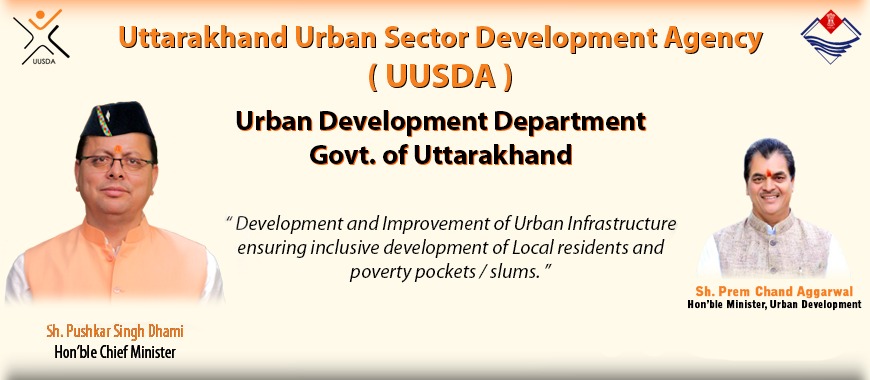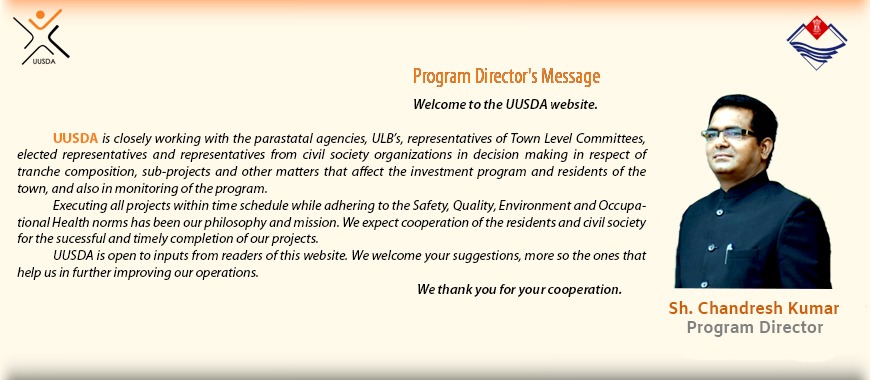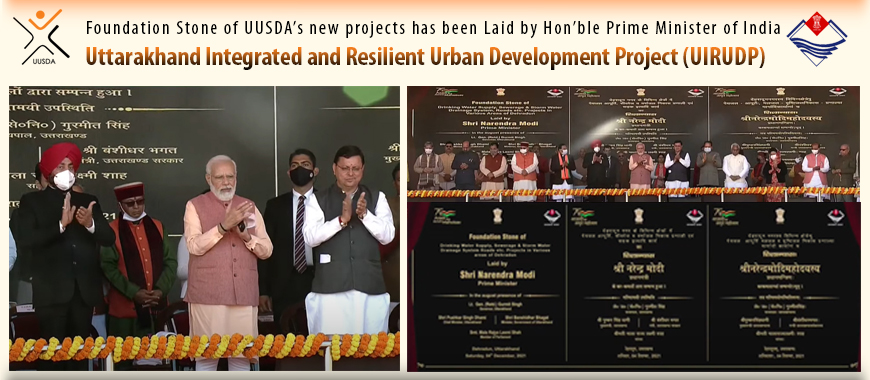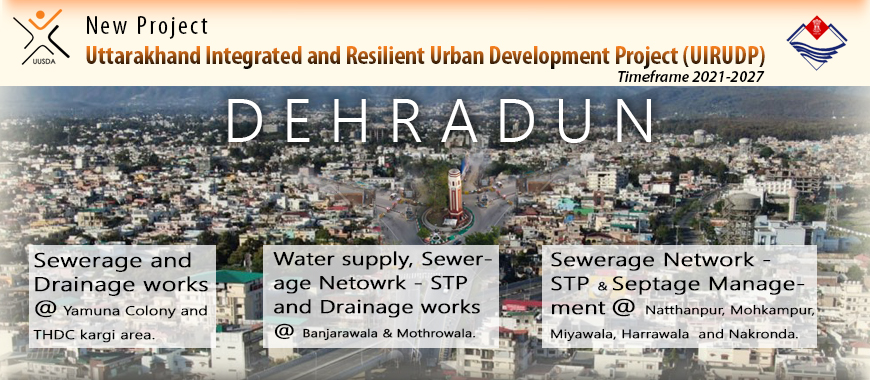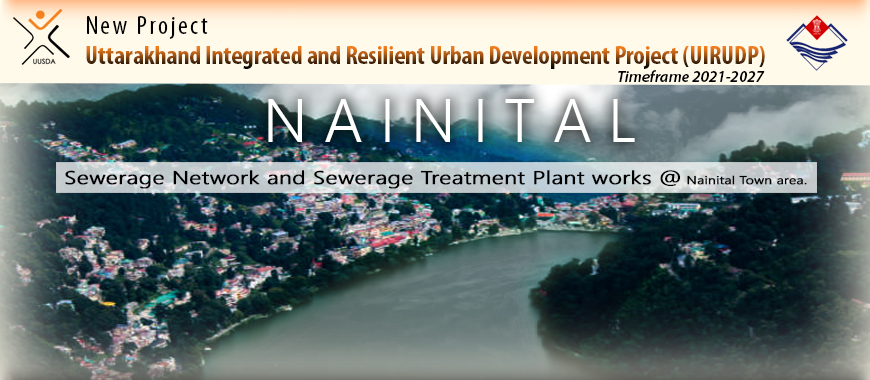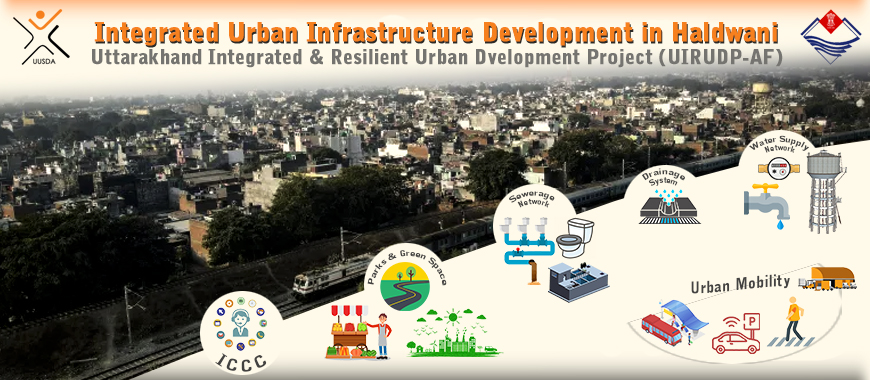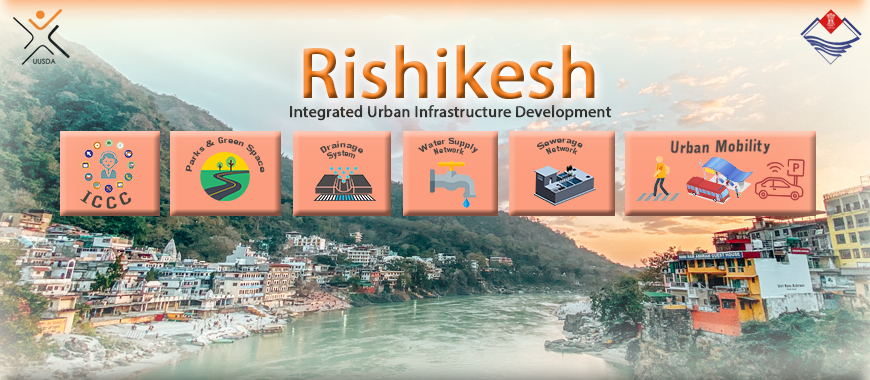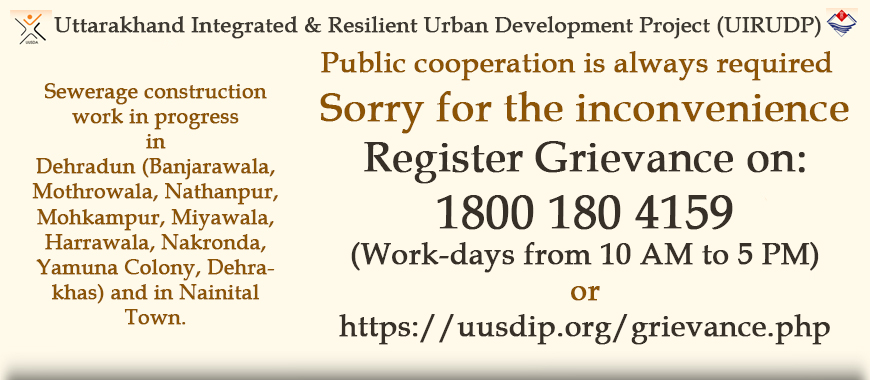- DEA-GoI accorded financial assistance approval from ADB of Total Outlay US$ 250 Million [80(US$ 200m) :20(US$ 50m)] on dated: 18.03.2018 in 2 Tranches of US$ 100 Million financial assistance.
- Urban Infrastructure of 06 major towns (Dehradun, Roorkee, Kotdwar, Nainital, Ramnagar and Haldwani) to be developed.
- First Phase : US$ 150 Million sub-projects(Dehradun & Nainital Towns) finalized with ADB.
- Detailed planning for Water Supply and Sewerage of Roorkee, Kotdwar, Nainital, Ramnagar and Haldwani Towns completed.
- MoU signed with ADB in December 2021.
- All 06 packages Contracts has been Signed and the works started
- Project Name
- Uttarakhand Integrated and Resilient Urban Development Project
- Project Number
- 38272-044
- Country / Economy
-
- India
- Project Status
- Active
- Project Type / Modality of Assistance
-
- Loan
- Technical Assistance
- Source of Funding / Amount
-
Loan 4148-IND: Uttarakhand Integrated and Resilient Urban Development Project Ordinary capital resources US$ 125.00 million TA 6840-IND: Enhancing Climate Resilience in Uttarakhand Urban Development Climate Change Fund US$ 750,000.00 Technical Assistance Special Fund US$ 250,000.00 Loan 4407-IND: Uttarakhand Integrated and Resilient Urban Development Project - Additional Financing Ordinary capital resources US$ 200.00 million - Operational Priorities
-
- OP1: Addressing remaining poverty and reducing inequalities
- OP2: Accelerating progress in gender equality
- OP3: Tackling climate change, building climate and disaster resilience, and enhancing environmental sustainability
- OP4: Making cities more livable
- OP5: Promoting rural development and food security
- OP6: Strengthening governance and institutional capacity
- OP7: Fostering regional cooperation and integration
- Sector / Subsector
-
-
Water and other urban infrastructure and services / Urban flood protection - Urban policy, institutional and capacity development - Urban sewerage - Urban water supply
-
- Gender
- Effective gender mainstreaming
- Description
-
The Uttarakhand Integrated and Resilient Urban Development Project (UIRUDP) supports the improvement of universal and equitable access to safe and affordable drinking water, and access to adequate and equitable sanitation and hygiene for all ending open defecation, in support of Uttarakhand Vision 2030.
The project will apply a range of integrated, resilient, and innovative solutions: (i) centralized and decentralized sanitation systems and mobile toilets to enhance citywide inclusive sanitation (CWIS); (ii) citywide computerized maintenance and management systems (CMMSs) for WSS, based on smart technology and the first of its kind in India; and (iii) various measures to improve climate resilience. The project will also (i) promote behavioral change toward water and resource savings, and better hygiene practices; (ii) empower communities for WSS-related jobs and foster entrepreneurial skills; and (iii) strengthen the institutional knowledge and capacity of state and local governments for integrated, sustainable, and climate-resilient urban development in Uttarakhand.
- Project Rationale and Linkage to Country/Regional Strategy
-
The state of Uttarakhand, located in the northern part of India, is one of the fast-growing states supported by manufacturing industries and tourism. As hill agriculture became unstable and better opportunities for jobs and education became increasingly concentrated in urban centers, urban migration from hill villages has intensified rapid urbanization. Unplanned urbanization and the challenges to mobilize human and financial resources led to significant gaps in the provision of basic infrastructure and services to growing urban areas. The lack of clean water supply and sanitation (WSS) systems and services in particular poses disproportionate burden on the poor, which is estimated at around 15% of urban population.
The Government of Uttarakhand (GOU) articulated its WSS goals and targets in its vision document, Uttarakhand Vision 2030, which are: (i) universal and equitable access to safe and affordable drinking water, and (ii) access to adequate and equitable sanitation and hygiene for all and end open defecation.3 Under the WSS goals, the 2030 targets specific to urban WSS in the state are (i) all urban households with access of piped water, compared to 30% of urban households in 2017; and (ii) 100% of urban local bodies (ULBs) with partial sewerage, compared to 28.6% of ULBs in 2017 .
Among many urban areas in Uttarakhand that require investment, GOU, with ADB's support, prioritized the investment based on the urgency, scale of impacts, safeguards sensitivity, project readiness, and ULB ownership. Two project locations were selectedDehradun and Nainital. Dehradun, the winter capital of Uttarakhand, is the most populous city in Uttarakhand experiencing unprecedent speed of urban sprawl. Compared to the 2011 census data of 569,578 living in 61 wards with a total area of 64.6 square kilometer (sq km), Dehradun experienced fast growing peri-urban areas with huge influx of urban migrants and carried out re-boundary mission in 2018. As a result, Dehradun has expanded to 300% in area (196.48 sq km) and increased by 141% in population (803,983 in 2018) living in 100 wards. The urban master plan of Dehradun-2025 drafted in 2015 has not been updated to address its urban expansion and the necessary provision of urban infrastructure and services. The WSS investment gap is significant, particularly on sanitation system and services in new Dehradun area. Untreated wastewater and fecal sludge are directly disposed to Rispana, Bindal, and Suswa rivers causing severe environmental and health risks.
Nainital, the judicial capital of Uttarakhand, is set in a valley of steep mountains around Nainital Lake. Estimated population of Nainital in 2020 is about 60,000. Compared to the 2011 census data of 41,377, the urban population is increased by 50%. As Nainital is a highly popular hill station, the average number of daily visitors to Nainital is around 72,650 with 90% staying overnight. Severe water stress resulted from the constantly increasing number of urban residents and the high-reaching floating population, which is 120% higher than the residents. Moreover, the observed depletion of ground water that has been a major drinking water source, and deterioration of surface water quality, led to the restriction of the duration of water withdrawal from tube wells by the water authority in Nainital. The service hours of tap water have been reduced despite the sufficient water supply infrastructure developed by ADB-financed project. The aging sewerage networks with leaks and insufficient sewerage treatment capacity has worsen water pollution, making it difficult to tap on surface water as an alternative drinking water source. Upgrading of the aging sewer networks built around 1940 and the necessary expansion of sewerage treatment capacity in Nainital are urgent tasks for the system sustainability of both WSS.
ADB's collaboration with Bill and Melinda Gates Foundation and National Institute of Urban Affairs led to the improvement of the project design. Fecal sludge and septage management is added and integrated to the centralized sewerage system through installation of co-treatment unit at the proposed STP in Dehradun. To expand the benefits of using smart technologies like SCADA and GIS, ADB introduced CMMS solutions, which will transform labor- and resource-intensive, and reactive O&M and asset management practices in WSS into modernized, systemized, proactive, and efficient ones. CMMSs will reduce O&M costs through prediction, planning, and scheduling preventive maintenance; increase equipment life and reliability; boost employee productivity; and improve customer satisfaction through preventing problems and quickly redressing their complaints. Responding to the GOU's concern on water scarcity and water pollution and its request, ADB introduced EBA measures (also called nature-based solutions) that can bring multiple benefits such as drought mitigation, heat stress reduction, flood control, water quality improvement, carbon sink, aesthetic quality, recreational and restorative capacity, local air quality improvement, and health benefits. The TA attached to the proposed project will support the conceptual design and feasibility assessment of these EBAs, which can contribute to the preparation of a future project in Uttarakhand.
- Impact
-
(i)Universal and equitable access to safe and affordable drinking water improved, and
(ii)access to adequate and equitable sanitation and hygiene enhanced to end open defecation. (Uttarakhand Vision 2030)
Project Outcome
- Description of Outcome
-
Reliability and efficiency of resilient WSS services in Dehradun, Haldwani, and Nainital, and Tanakpur enhanced
- Progress Toward Outcome
- Detailed assessment to identify the functions for CMMSs is ongoing.
Implementation Progress
- Description of Project Outputs
-
Resilient water supply system and service in Dehradun, Haldwani, and Tanakpur improved
Integrated and resilient sanitation systems and drainage established in Dehradun, Haldwani, and Nainital
CMMSs for water and sanitation developed and implemented in Dehradun, Haldwani,Nainital and Tanakpur
Institutional capacity and knowledge strengthened
- Status of Implementation Progress (Outputs, Activities, and Issues)
-
OUTPUT 1: A total of 110.86 (81%) of water supply pipelines were installed and a total of 8,142 (150%) household connections have been provided. Installation of water supply pipeline is likely to be achieved by November 2027 while target on household connections was already achieved.
OUTPUT 2.
DEHRADUN:
- Detailed designs for both STPs are finalized and approved for Dehradun. The contract Packages WW-DDN-02 was awarded in Nov 2021 and work commenced in Apr 2023 with about 35% physical progress. The contract Packages WS&S-DDN-01 was awarded in Nov 21 and work commenced in Dec 2022 with about 27% physical progress. A total of 223 km (87%) sewer pipes was installed, and 9437 manholes and 31km (27%) stormwater drainage were constructed. A total of 16,005 (92%) household sewer connections installed in Dehradun.
NAINITAL
- For the 1 STP with 17 MLD capacity in Nainital, construction was initiated in September 2021 and was progressing satisfactory (22% of work have been done) until perennial landslides occurred in the area in October 2021, January 2022, March 2022, and June 2023 forcing the works to stop. There is a need to incorporate ground consolidation measures before resuming the works. These technical measures are in advance stage of discussion between the technical institute and UUSDA.For the 4km of aging trunk and replacement of outfall sewers, works was also affected by the landslides. The reassessment of trunk and outfall sewers has been done and detailed design was prepared and approved recently. A total of 1,800m CIPP lining is completed. The remaining work is in progress. DPR for the 20 mobile toilet buses (gender-sensitive and inclusive design features) is under preparation, and is planned to be completed by Q3 of 2024. The implementation of this package is targeted from Q2 of 2025 until November 2027, as per approved timeframe of GESI -AP.
OUTPUT 3. Initial system and governance assessment of IT infrastructure and water supply operation and maintenance is ongoing, which is required to prepare CMMSs DPR and bidding documents. It is likely to be achieved by November 2027.
OUTPUT 4. Likely to be achieved by November 2027.
Project review and consultations missions were regularly conducted to ensure smooth and up-to-date implementation of the loan project.
- Loan Inception Mission: March 2022
- Loan Review Mission: September 2022
- Loan and TA review mission: June 2023
- Loan and TA review mission: February 2024
- Geographical Location
- Dehra Dun, Nainital
Safeguard Categories
- Environment
- B
- Involuntary Resettlement
- B
- Indigenous Peoples
- C
Summary of Environmental and Social Aspects
- Environmental Aspects
- The Project is classified as Category B for environment based on ADB Safeguard Policy Statement (SPS) 2009. Accordingly, draft Initial Environment Examination (IEE) reports including Environmental Management Plans (EMPs) for the six Design-Build-Operate (DBO) packages were prepared and disclosed through the ADB Website. Based on the IEEs, the Project is unlikely to have significant adverse environmental impacts that are irreversible, diverse, or unprecedented. Potential environmental impacts are mostly due to construction which is short-term and site-specific and can be mitigated based on the measures defined in the Environmental Management Plan (EMP). Updated IEEs will be prepared based on the Contractor's detailed design and will be disclosed also on the ADB website.
- Involuntary Resettlement
- No major issue.
- Indigenous Peoples
- No issue.
Stakeholder Communication, Participation, and Consultation
- During Project Design
- Stakeholder communication and consultation have been done during the project design phase.
- During Project Implementation
- Regular stakeholder consultations have been carried out.
Business Opportunities
- Consulting Services
-
For L4148:
- Project management and construction supervision firm was engaged in 2020.
- Recruitment for Community Awareness and Public Participation Agency is on-going.
Other consulting services recruitment would commence in 2024.
- Hydrology and geotechnical consultant ($0.30 million)
- Nainital watershed assessment consultant ($0.30 million)
- Intelligent asset and service management consultant ($1.00 million)
For TA 6840: The firm on Climate Resilience Modeling, Planning, and Designing was engaged on December 2022.
- Procurement
-
All the civil works contracts were awarded.
Contracts (goods) expected during project implementation:
- Bus mobile toilets with 5-yr O&M ($1.50 million)

